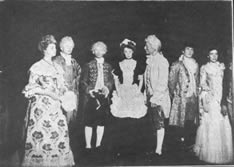
<<
Back
The
traditional Methodist prejudice against the theatre effectively
banned dramatic and other stage performances from the campus during
the entire Indiana Asbury period as well as the early DePauw years.
Occasional visits by faculty members and students to Indianapolis
to view such forbidden entertainments came under the strong disapproval
of President Alexander Martin
as late as 1881. Nevertheless, the senior class was somehow able
to put on a play at the Opera House on the square in the spring
of that very year. Entitled "Esmerelda," it was a popular
hit with both students and townspeople but apparently so alarmed
the university authorities that no similar performance took place
for more than two decades. The next recorded presentation of an
English-language play at DePauw was in 1905, when Shakespeare's
"As You Like It" was performed in Meharry Hall.
In 1906 Professor Rufus B. von KleinSmid organized a Dramatic Club
which presented two plays, "His Lordship" and "She
Stoops to Conquer." Though this organization proved short-lived,
it signaled the onset of a flood of student interest in the theatre.
In the next few years there were presented senior class plays, May
Day plays performed by coeds, and a dramatized version of Charles
Dickens' Our Mutual Friend sponsored by the Y.M.C.A. In 1913 students
in the Music School presented the first opera seen at DePauw, the
"Bells of Corneville," with a 25-piece orchestra and a
chorus of 25 voices all directed by Professor Howard Barnum. The
next year the operetta "Bohemian Girl" was performed as
a part of a May Music Festival. By this time Harry B. Gough, head
of the department of public speaking, had begun to bring most campus
dramatic activities under departmental control.

______________________________________
She
Stoops to Conquer was performed in 1907
and was one of the first
live drama given by
students at DePauw.
_______________________________________
Duzer Du was organized under his auspices as a dramatic honor society
in 1913 and presented its first production, Sheridan's "School
for Scandal," on April 28, 1914 on the stage of Meharry Hall.
But the installation of the Bowman pipe organ made Meharry Hall
practically useless for such stage presentations. With the closing
of the Academy in 1914 the administration decided to remodel the
assembly room on the second floor of West College into a small
auditorium, constructing a stage at the south end of the room and
installing a number of old opera chairs and school benches for seating.
The theatre opened with Duzer Du's performance of George Bernard
Shaw's "Arms and the Man" in the fall of 1914. For 14
years this auditorium served as the home of DePauw's Little Theatre.
Before West College was declared unsafe for public accommodation
in 1928, 53 full-length plays and 35 one-act plays had been presented
on its stage. Theatre had arrived to stay.
Back
to Top
<<
Back
|


